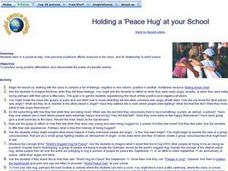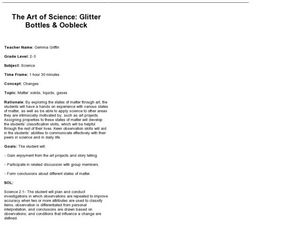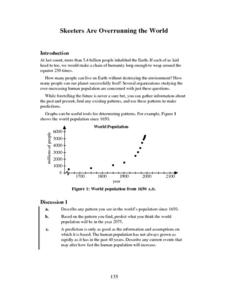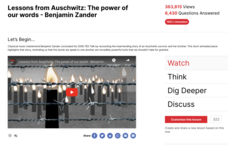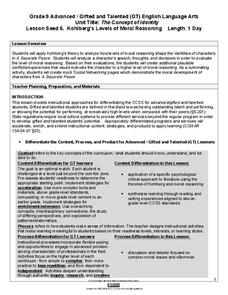Curated OER
Flutter Farm
Students create their own butterfly garden and follow a participation plan to ensure that everyone will have a hand in the garden. In this gardening lesson, 5th graders log their progress with their garden by taking photos,...
Curated OER
Little Red Hen Bakes Bread
Students investigate the bread baking process through the use of literature. In this reading comprehension lesson, students read the book, The Little Red Hen and discuss the steps the hen followed to bake bread. Students bake the bread...
Curated OER
Land Plan Challenge
Links to two different versions of this mapping activity are available. In "The Small Version," youngsters design a town, keeping the water supply in mind. In "The Large Version," they also design a town, but they consider services and...
Curated OER
Holding a 'Peace Hug' at your School
Students consider feelings. In this positivity lesson, students realize how they can create a peaceful environment with their words and actions. They discuss feelings and personal experiences as a class and expand out to the rest of...
Curated OER
The Art of Science: Glitter Bottles and Oobleck
After having a class discussion on the three states of matter, young scientists utilize the wonderful substance, Oobleck in order to experience something that changes states of matter. They also create "sparkle jars" which...
Curated OER
Wetland vs. Stream Macroinvertebrates
A link to a comprehensive macroinvertebrate guide gives you the information needed to prepare for this field study activity. Sample macroinvertebrates are collected from areas representing different environmental conditions. Junior...
Learning to Give
Five Thousand Dollars!
How does consumerism affect global poverty? Upper graders find out about cost benefit, wants and needs, and making good consumer choices as they explore this global topic. They role-play an impulse spending experience and work through...
Illinois Department of Natural Resources
Section Two: Why is Biodiversity Important?
Explore soil, genetic traits, natural resources, and pollution in a series of lessons that focus on biodiversity. Kids complete experiments to learn more about the importance of varied genes and organisms in an ecosystem.
Curated OER
Pride and Prejudice: Question Answer Relationship Strategy
Help middle and high school readers access the text with a series of question-answer relationship (QAR) strategies. Using Jane Austen's Pride and Prejudice as an example, the resource prompts learners to ask and answer questions using...
Curated OER
The Red Badge Of Courage: Directed Reading Thinking Activity
As part of a Directed Reading Thinking Activity (DRTA) class members are asked to predict events in Patricia Polacco's Pink and Say based on illustrations in the story, on their knowledge of Steven Crane's The Red Badge of Courage,...
Teach Engineering
Hydrogen-Oxygen Reaction Lab
High schoolers conduct an experiment using the reaction of hydrogen and oxygen. After pairs balance the chemical equation for making water, they mix different ratios of hydrogen and oxygen in a chemical reaction. Classmates...
Curated OER
Investigating What Makes Fruit Go Brown
Is there anything that can be done to slow the browning of fruit once it has been cut? High schoolers determine the answer through five different investigations involving apples, potatoes, and chemical reactions. After each experiment,...
Developing a Global Perspective for Educators
Imagine Being Me
The design of this two-day instructional activity eloquently exposes learners to the topic of social justice for people with disabilities. The plan is built off the reading of Are You Alone on Purpose? by Nancy Werlin. The activity...
Japan Society
Akutagawa Ryunosuke and the Taisho Modernists
Japan's Taisho Period was a time when authors like Akutagawa and other Japanese modernists began to experiment with point of view and literary form, making the literature produced during this time period a natural choice for teaching...
ARKive
Plants
Here is a one-hour activity that helps learners remember the parts of plants. Not only will the class learn about plant parts, they'll also discuss seed dispersal and plant growth. A celery experiment is used to show how plants obtain...
Institute of Electrical and Electronics Engineers
Failure: Seeds of Innovation
"If at first you don't succeed, try, try again!" Through this assignment, emerging engineers examine how failed experiments are simply part of the process of an outstanding design. They begin with some reading about the microwave oven,...
Annenberg Foundation
Skeeters Are Overrunning the World
Skeeters are used to model linear and exponential population growth in a wonderfully organized lesson plan including teachers' and students' notes, an assignment, graphs, tables, and equations. Filled with constant deep-reaching...
TED-Ed
Lessons from Auschwitz: The Power of Our Words
Some words are best left unspoken. Words matter, according to Benjamin Zander, conductor, teacher, and lecturer. To illustrate his point, Zander recounts a story told to him by a survivor of Auschwitz. As a result of her experience...
National Gallery of Canada
Morphosis
Experience anthropomorphism and metamorphosis in action with flipbooks! Instead of giving human characteristics to animals, though, pupils will show a transformation from human to animal or vise versa through their drawings. The...
Signing Time Foundation
What is the Water Cycle?
Dive into an exploration of the water cycle cycle with this simple earth science lesson. After first discussing where rain comes from, young scientists define the terms condensation, evaporation, transpiration,...
John Wiley & Sons
Defining Leadership
Learners use their experience with leadership, as well as a thought-provoking quote and discussion with their classmates, to help them define the concept of leadership.
Visa
Making Spending Decisions
By role playing real-world experiences, such as purchasing snacks and grocery/toy store shopping, your youngsters will begin to develop an understanding of how to make decisions and choose between alternatives. This is the first...
Ohio Department of Education
Observe Then Infer
To develop their skill at drawing inferences from observations, sixth graders rotate through six stations, conduct a series of experiments, make observations, and draw inference from what they observe.
Maryland Department of Education
The Concept of Identity Lesson 6: Kohlberg's Levels of Moral Reasoning
How does our moral reasoning shape our identity? After a study of Kohlberg's Levels of Moral Reasoning, readers use Kohlberg's theories to analyze the speech, thoughts, and decisions of a character in A Separate Peace. They then...
Other popular searches
- Science Experiments
- Friction Experiments
- Water Pollution Experiments
- Life Science Experiments
- Density Experiments
- Air Pollution Experiments
- Electricity Experiments
- Egg Science Experiments
- Egg Experiments
- Chemical Change Experiments
- Rocket Experiments
- Cloud Experiments



